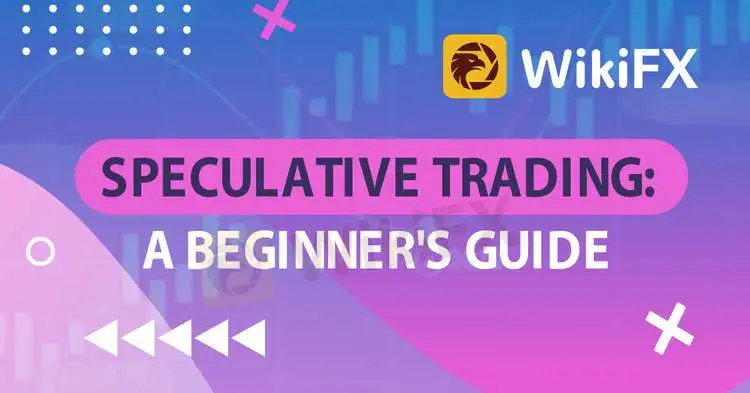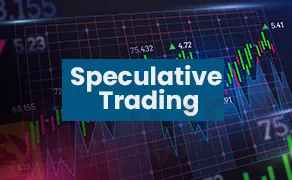简体中文
繁體中文
English
Pусский
日本語
ภาษาไทย
Tiếng Việt
Bahasa Indonesia
Español
हिन्दी
Filippiiniläinen
Français
Deutsch
Português
Türkçe
한국어
العربية
SPECULATIVE TRADING: A BEGINNER'S GUIDE
Abstract:The investment industry is a complicated, sophisticated, and at times intimidating place. There are several types of traders, each with its own set of incentives and success strategies. The speculative trader is by far one of the most popular sorts of traders. This article explains what speculative trading is and why it differs from investment.

SPECULATION DEFINITION
Speculative trading is a type of trading in which traders seek to benefit from market price swings, whether the market is rising or falling. It differs from typical investing in that it focuses on the basic values of a transaction. Contrary to common assumptions, financial speculation is not as dangerous and lucrative as many might believe. It also does not always apply to transactions with strong profit potential.
Speculative trading, on the other hand, is primarily focused on, you guessed it, speculation. The art of conjecture does not have a single focus. This implies that speculation can allow us to acquire an asset (if we anticipate its price to rise) or dispose of an asset (if we expect its price to fall).
In terms of risk, speculative trading can be controlled just as well as any other standard investment. So, in many ways, it is similar to traditional investing, and the capacity to play both sides (up/down) provides you a little advantage over investors who just hunt for things that will rise. In black swan events, we can find evidence of speculative trading.
So, talking about the black swan event. They are highly unusual and difficult to foresee occurrences that have a massive economic impact. The 2008 global financial crisis is an example of such an occurrence.

EXAMPLE OF SPECULATIVE INVESTMENT
Let us use the same example: the global financial crisis of 2008. So, how did 2008 go? The emergence of a housing market bubble, which began in 2007, triggered the worldwide crisis. Lower interest rates lowered lending rates for both businesses and people. As a result of the low-interest rates, homeowners took out loans they couldn't pay, forcing housing values to rise. These subprime loans were then repackaged and sold as low-risk financial products, culminating in the establishment of a market for them.
Interest rates eventually soared, and house ownership achieved a critical threshold. Home values fell, causing defaults and causing massive ripple effects that contributed to the global economy collapsing in 2008.
So, what does this have to do with speculative trading? While most investors were bullish on the economy, hedge fund manager Michael Burry was among the first to bet on and benefit from the subprime mortgage crisis, seeing and forecasting the fall of the housing market crash.
He shorted the marketplace by convincing investment banks to offer him credit default (which reimburse him in the event of a default) on subprime loans he perceived to be susceptible. He made a personal gain of $100 million as a result of his speculation.
SPECULATIVE TRADER TYPES
A speculative trader attempts to benefit from changes in the price of a certain financial instrument. We may categorize speculators based on their directional bias, trading style, and market participant categorization.
Directional view: A optimistic speculator expects the value of a certain financial asset to grow over time. As a result, they would take a long position. A trader who anticipates the US dollar to increase against the Swiss franc over a specified period, for example, would go long USD/CHF. A bearish speculator expects the price of a financial instrument to decline over time. As a result, they would initiate a short position. For example, a trader who expects the Euro to fall against the Australian Dollar would sell EUR/AUD. Learn more about the distinction between bull and bear markets.
Trading style: Short-term investors often aim to benefit from market moves that occur in a short period, which might be seconds, minutes, or hours. This trader may use an automation process or execute his deal manually. Swing traders maintain their positions for a longer length of time, which might range from a few days to a year or more.
Market participants are classified as follows: Banks, hedge funds, market makers, commodities trading corporations, and individual traders are among the market players willing to speculate.
HOW DO YOU MAKE YOUR GUESSES?
There are several techniques to guess in trading. They can be caused by basic factors, such as the subprime mortgage crisis discussed above. However, it is more frequently than not owing to technological issues (using technical analysis). In the realm of investing, there is a technique known as “technical analysis,” which employs several sorts of analysis on charts (mainly) to identify the direction of the market. Before making such trades upon technical analysis, little to no investigation is done on a company's fundamentals. Learn about some of the important technical indicators utilized in technical analysis while speculating on live charts.

Disclaimer:
The views in this article only represent the author's personal views, and do not constitute investment advice on this platform. This platform does not guarantee the accuracy, completeness and timeliness of the information in the article, and will not be liable for any loss caused by the use of or reliance on the information in the article.
Read more

RM5.9M Lost to "Davidson Kempner Capital Management" Facebook Scam
A private contractor in Malaysia faced a devastating loss of over RM5.9 million after falling victim to a fraudulent investment scheme promoted on Facebook. Tempted by the scheme’s impressive claims and credentials, the victim began investing in September 2024. The investment process required him to download an application called A-Trade, which was readily available on the Apple Store.

Challenge Yourself: Transform from Novice to Expert
From a forex novice to a trading expert, all it takes is this one opportunity! Join us for the Forex Beginner's Advancement Journey challenge and unlock your potential! Here, if you're a beginner, participating in the event and posting on selected topics will not only deepen your understanding of forex basics and help you advance but also earn you a Learning Encouragement Award. For those with some experience in forex, discussing insights under the event topics will allow you to exchange experiences and share techniques with like-minded peers, while also having the chance to win a Perspective Sharing Award! Come challenge yourself and break through the limits of forex trading together!

Big News! UK 30-Year Bond Yields Soar to 25-Year High!
Following the successful auction of 30-year government bonds by the UK, the yield on 30-year bonds surged, reaching its highest level in 25 years. This increase reflects growing concerns in the market over the government's fiscal policies and large-scale debt issuance.

Beware of Fraudulent Letters: Malaysia’s Securities Commission Issues Warning
The Securities Commission Malaysia (SC) has raised an alarm over fraudulent letters and emails falsely claiming to be from the regulatory body. These fake communications are allegedly tied to illicit investment schemes that seek payments from unsuspecting investors.
WikiFX Broker
Latest News
SQUARED FINANCIAL: Your Friend or Foe?
Big News! UK 30-Year Bond Yields Soar to 25-Year High!
ACY Securities Integrates MetaTrader 5 to Enhnace Copy Trading Service
Soegee Futures Review: Should You Trust This Broker?
Malaysian Pilot Loses RM1.36 Million in UVKXE Investment App Scam
Indonesia officially joins the BRICS countries
Attention! Goldman Sachs Cuts Gold Target to $2910
Inflation Rebounds: ECB's Big Rate Cut Now Unlikely
Carney \considering\ entering race to replace Canada\s Trudeau
High-Potential Investments: Top 10 Stocks to Watch in 2025
Currency Calculator






